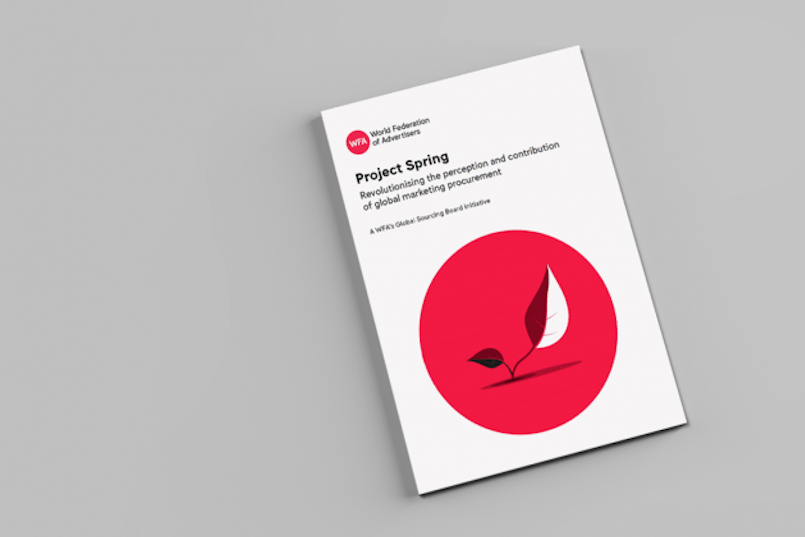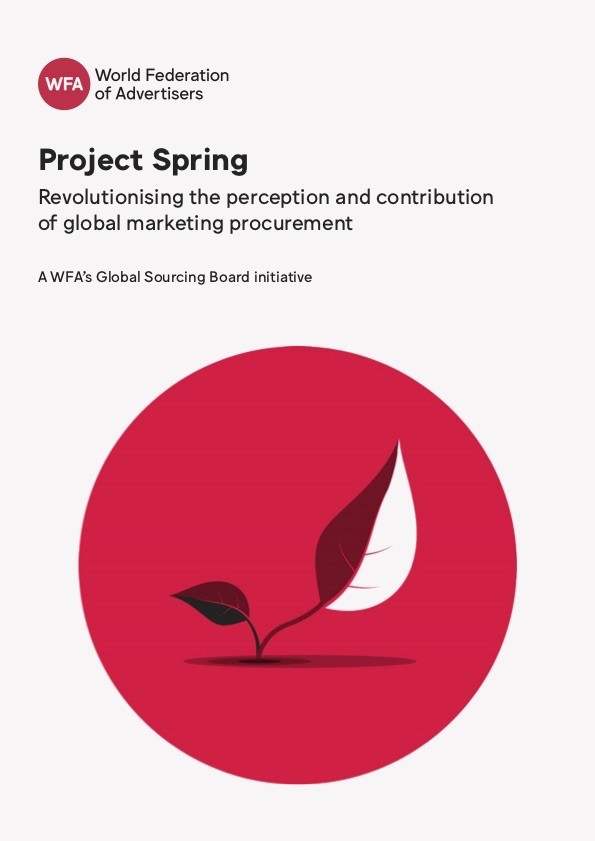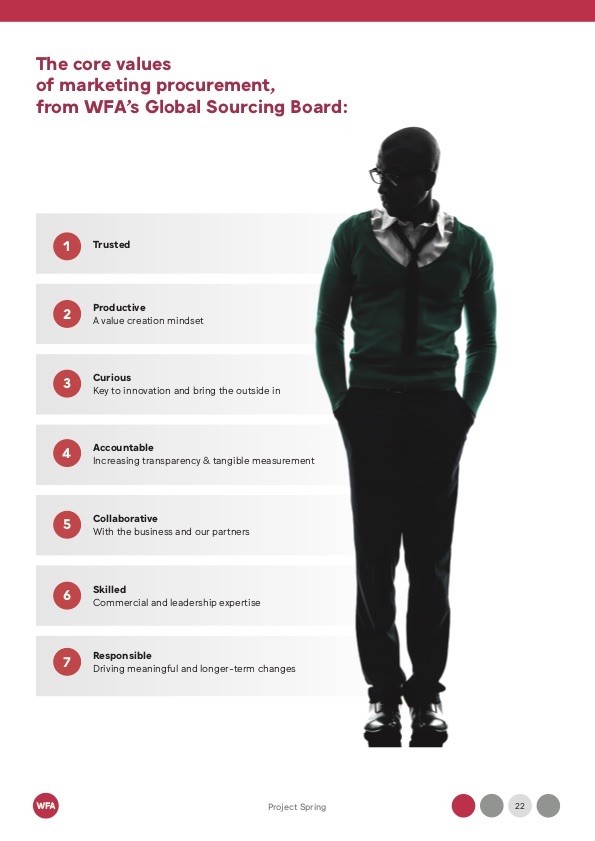“It’s time for a revolution in marketing procurement. A transformation from savings to value, which can rid the profession of bad practice and reduce the number of opportunities for negative articles about the discipline” read the press release and the WFA webpage at the time.
It went on: “Evolving perceptions, however, also requires changes in the way procurement works with its stakeholders inside and outside each company: evolution to procurement processes, improving people’s understanding of procurement, building new performance KPIs beyond just savings and involving external partners to ensure a true perspective”.
This is the Project Spring report, released mid-2020, designed to help everyone on that journey.
You can download a copy of the WFA Project Spring report here.
The report is based on two years’ work of the WFA Global Sourcing Board and WFA Sourcing Forum. It identifies the elements that impact perceptions of marketing procurement, as well the progress that has been made since WFA started formally to raise the topic within its network in 2018.
Project Spring is designed to inspire an end the “race to the bottom” that some marketing procurement practitioners are contributing towards; blindly cutting costs and reducing fees. It is not a roadmap to perfect practice but the start of a journey. As with any transformation, the drive to create a “value in” instead of a “cost out” should never end.
Of most interest is the list of core values for marketing procurement as defined by the WFA Global Sourcing Board. This is a group of heavy-hitting global procurement professionals with a significant vested interest in marketing expenditure, with companies represented including Mondelez, Diageo, GSK, IKEA, L’Oreal, Mars, P&G, McDonald’s and more.
This is a group in the know, not just when it comes to marketing, but also procurement and sourcing generally. So, it is definitely well worth paying attention.
In the 40-page report, there is one page outlining these core values. Unfortunately, there is no explanation of these values, except in the context of the whole report. It could be it was felt they are self-explanatory. But perhaps not. So, I have prepared some notes to elaborate on each of these.
Trusted – Trust is a major issue in managing marketing suppliers and vendors such as advertising agencies. In high-performing client/agency relationships there is a significant level of trust required. Procurement should be aware and respectful of this and not play games or appear to play games like withholding information or not answering reasonable questions. It comes across as a powerplay. For example, if an agency enquires about selection criteria, why would you unreasonably withhold this information?
Productive – In the book, “The Machines that Changed the World”, they tell the story of the procurement-led adoption of lean manufacturing and how it drove the growth of the Toyota Motor Corporation in the 1980s. It is a great read for anyone confused about the true role of procurement. It is also said you cannot cut your way to growth. The idea of a productive procurement team is one that looks for productive growth opportunities over mindless cost-cutting. For example, a measure of success for any marketing procurement project should not be achieving a 10% cost reduction alone.
Curious – This means never bring your preconceived ideas to the category. Always be willing to look at collecting data, both structured and unstructured, ask questions of the key players and the industry, research best practice and a common practice for the industry before you develop and implement your procurement strategy. For example, it drives me crazy the number of procurement people that tell me buying media is like buying any commodity yet resort to the most rudimentary and often flawed pricing metrics of CPM (cost per thousand) as their measure of quality.
Accountable – Yes, be accountable. But not just to the spending and the savings. Be accountable for the quality and productivity. Be accountable for the strength of the supplier relationships. Be accountable for the performance of the marketing investment. And if you find there is no accountability, work to develop a process of accountability for marketing and all of their supply chain. For example, if there is no methodology for measuring ROAS (Return On Advertising Spend) help to implement one, rather than simply assume there is no return.
Collaborative – Does collaboration drive trust or is trust required to collaborate? It is not chicken and egg. By engaging with the marketing team and the suppliers and vendors and inviting their input and listening to their challenges and suggestions you become a collaborative and eventually trusted partner. For example, the solution to supplier underperformance is not to tender the supplier. Often changing suppliers may appear to solve the problem in the short term, but the issue may actually lay in the marketing team.
Skilled – You do not need to be a marketing expert to add value as a procurement partner. But the skill you do need to learn is the language of marketing. It is a language that is often baffling and confusing to the commercially minded. But understanding the words marketers and their agencies are using allows you to identify how to put your procurement skill to best use. For example, by bonusing a media agency on media price reductions the procurement team were rewarding the media agency to increase their investment in dubious, low quality, under-performing programmatic digital media.
Responsible – At TrinityP3 we have a purpose: to improve the marketing output of every single organisation that engages us. We take this responsibility seriously. If you are adding value in today’s business environment, this goes beyond price and quality. Increasingly, procurement teams are taking on responsibility for supply chain risk from modern slavery, the climate crisis and any number of the 17 UN Sustainable Development Goals. For example, pursuing a cost-cutting objective does not mean chasing cost reductions at the expense of good corporate social responsibility by having the media budget fund terrorism, child sex trafficking or other criminal activity.
Hope this has provided you with a broader context on the seven core values for marketing procurement as defined by the WFA Global Sourcing Board. Because adding tangible value to marketing has always been more than cutting the cost of doing business.
This article first appeared in Producers & Procurers iQ on June 4, 2021
For more than 15 years we have been helping marketers and marketing procurement teams address and solve challenges, so the question is how can we assist you?






